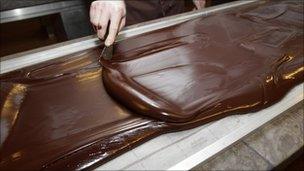Cocoa highs hit chocolate makers
- Published

Major confectioners have already raised prices by up to 10%
The Easter holidays are usually a time for bumper profits for confectionery giants, as many consumers indulge their love of chocolate.
But consumers are being lured by ''buy one get two free'' promotions, such offers mask what has been a difficult year for many chocolate makers.
They've had to cope with soaring prices of raw materials without passing too much of the cost onto cash-strapped consumers.
At Whiteley's shopping centre in London, five tonnes of chocolate pours down a chocolate waterfall.
This recreation of Willy Wonka's masterpiece by food architects Bompas and Parr certainly wasn't a cheap stunt.
"When you are dealing with tonnes of chocolate, the tiniest fluctuation in the price of cocoa can have a massive difference," said Sam Bompas, its co-creator.
"We don't want to compromise how epic the chocolatey-ness is, but we find ourselves chopping out other things from our installations to save money.''
Bompas and Parr were inspired by Willy Wonka's chocolate fountain
Supply disruptions
The price of cocoa beans, the essential ingredient for waterfalls, Easter eggs and simple chocolate bars, has doubled in price over the past five years.
On the London futures market, cocoa was trading at around 拢896 a tonne in April 2006. This week the price was close to 拢2,000 a tonne.
Like many other commodities, it has been seen as an attractive investment over the past few years, but supply and demand problems have pushed its price up further.
Then came the political crisis in the Ivory Coast, the world's top cocoa exporter.
''The unrest in the Ivory Coast has really exacerbated the high cocoa prices we have seen over the past few years," said Jonathan Parkman, joint head of agriculture at brokerage, Marex Financial.
"It's not just the price of cocoa, there are a number of different raw ingredients that go into the making of chocolate and they have pretty much all gone up, so manufacturers have really had a tough time."
The US manufacturers Hershey's, which makes Reese's peanut butter cups, put up prices by just under 10% this year.
European giant Nestle has kept increases to 1.6% and Kraft, the owner of Cadbury's, says it is focusing on cost savings elsewhere to try to prevent having to pass on higher ingredients' costs to customers.
Further rises
The founder of high-end chocolate maker Rococo says they are trying to limit price rises
So far, sales have held up well in this difficult economic climate. Chocolate is seen as an affordable luxury and is often cushioned from shopping basket cutbacks.
But if prices continue to rise, customers will switch to cheaper brands in much greater numbers.
So high-end chocolatiers have had to work hard to keep customers.
Rococo chocolates saw a big dip in sales during the financial crisis but they have since bounced back.
"The price of cocoa, like the price of oil, keeps going up and up and up," said Chantal Coady, Rococo's founder and creative director.
"We have worked very hard to limit retail price rises but we have also found that once people have acquired a taste for really fantastic chocolate it is quite hard to go back, a bit like wine, probably."
She adds that although people may be coming a little less often, they are still spending.
So where will wholesale prices go from here?
''Although the situation in the Ivory Coast is nearly resolved, it is by no means completely resolved and we can certainly expect prices to be volatile over the next few months,'' said Jonathan Parkman.
But despite the fluctuating price of cocoa on world markets, Mintel predicts that seasonal and chocolate box sales will increase by 13% over the next four years.
For many consumers chocolate is a hard habit to kick, whatever the price.